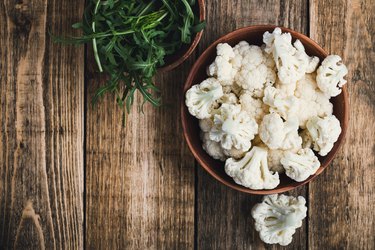
Potatoes and cauliflower can both be solid choices to add to your regular diet. However, when it comes to cauliflower versus potato, cauliflower has some advantages including be lower in calories and carbs. Plus, cauliflower generally comes out ahead with versatility and nutrients profile.
Video of the Day
Video of the Day
Potato Nutrition Facts
Potatoes are have several potential health benefits. However, to get the most out of the them, you need to eat the skin of the potato, too. The potato's skin is a the source of many of the nutrients including Vitamin C, fiber, potassium, folate and vitamin B6. However, not all potatoes are created equal. Potatoes with darker flesh tend to be more nutrient dense than white potatoes.
Potatoes themselves contain little fat. While this may be appealing to people looking to limit their fat intake, they also contain very minimal protein and fiber. Protein and fiber help you feel fuller longer.
The most abundant macronutrient in a potato is carbohydrates. According to the United States Department of Agriculture (USDA), a 148-gram potato contains 110 calories, 26 grams of carbohydrates and about 3 grams of protein.
While potatoes can be a healthy addition to your diet when prepared properly and consumed in moderation, a study published in the December 2015 issue of Diabetes Care correlated an increased or excessive amount of potato increases the likelihood of developing Type 2 diabetes and higher body mass index. This study also found that replacing potatoes with a serving whole grains correlated with lower body mass index and a lesser chance of developing Type 2 diabetes.
However, for other people looking to lose weight, potatoes may have some benefits. A study on mice published in the July 2016 issue of Experimental and Therapeutic Medicine showed that mice with obesity that were fed potato extract lost weight and fat. However, studies replicating this in humans have not been done or reported yet.
Cauliflower Nutrition Facts
The American Diabetes Association classifies cauliflower as a nonstarchy vegetable, whereas potatoes are a starchy vegetable. Plus, cauliflower is loaded with vitamins and minerals. According to the USDA, 1 cup of cauliflower has:
- 27 calories
- 2.1 grams of fiber
- 2.05 grams of protein
- 5.32 grams of carbohydrates
Cauliflower also contains high amounts of various vitamins and minerals. It is a good source of vitamin C, folate, vitamin K, vitamin B6 and potassium. Cauliflower also contains nutrients such as choline, which is involved in brain development, synthesizing DNA in cells, maintaining cell membranes and supporting metabolism.
Cauliflower is the darling of the weight loss community because it's so low in carbs. The neutral taste of cauliflower makes it a suitable substitution in dishes. Plus, cauliflower calories are low compared to calories in foods cauliflower is used as a substitute for. You might see cauliflower subbed for rice, potatoes, pasta and other starchy foods.
Read more: Healthy Low-Carb Eating Plan
Cooking Cauliflower and Potatoes
Preparation matters when it comes to both cauliflower and potatoes. Unfortunately, some of the most commonly thought of potato products — french fries and potato chips — are also the worst for you.
Potatoes also get a bad reputation because of the extras you might add to them. For example, many people add butter or heavy cream to mashed potatoes or make loaded baked potatoes with sour cream, cheese, bacon and so on. Any of these preparation methods reduce the overall health benefit of the potatoes you are eating.
Instead, for potatoes, you should bake or boil the potatoes with the skin on. This helps to reduce the loss of minerals and vitamins typically associated with cooking them. For cauliflower, steaming or boiling the cauliflower is best. In both cases, you should avoid adding high calorie or high fat extras. Instead, try using herbs, spices and limited amounts of salt to season your potatoes or cauliflower.
Like potatoes, cauliflower is very versatile when it comes to preparation. You can use it as a substitute for many different carbohydrates such as potatoes, white rice, pizza crusts and even mac and cheese. The sky is the limit for creating healthy cauliflower recipes.
However, if you are using cauliflower as a substitute for other foods for weight loss or adding nutritional value, you still need to choose healthy preparations. For example, if you use cauliflower to make mashed potatoes, adding butter or cream to the cauliflower is still adding empty calories that won't necessarily help your nutritional goals.
Cauliflower vs. Potatoes
When it comes to your diet, including both potatoes and cauliflower is generally a good idea. However, there are some exceptions due to the higher glycemic index score of some varieties of potatoes.
According to Harvard Health, the glycemic index is a measurement of how fast the body breaks down food into sugar. The higher the glycemic index of a food, the faster the body breaks it down and the more sugar the body releases quickly. This quick release of sugar can cause a person's blood sugar to spike.
People living with diabetes should check with their doctor or nutritionist before adding additional potatoes to their diet plan since many varieties score higher on the glycemic index. In those cases, a person may want to consider substituting mashed cauliflower for their mashed potatoes.
Cauliflower is lower in carbohydrates, offer more nutrients and has lower calories than potatoes. But if you don't have dietary restrictions, adding both cauliflower and potatoes to your regular diet can be beneficial.
- United States Department of Agriculture: "45365864, Potatoes, UPC: 033383530819"
- Experimental and Therapeutic Medicine: "Anti-Obesity and Anti-Diabetic Effects of a Standardized Potato Extract in ob/ob Mice"
- United States Department of Agriculture: "Basic Report: 11135, Cauliflower, Raw"
- Diabetes Care: "Potato Consumption and Risk of Type 2 Diabetes: Results From Three Prospective Cohort Studies"
- American Diabetes Association: "Non-Starchy Vegetables"
- Harvard Health Publishing: "Glycemic Index for 60+ Foods"